- Преподавателю
- Иностранные языки
- Методические указания по иностранному языку по теме Важность компьютера для обучающихся специальности Информационные системы
Методические указания по иностранному языку по теме Важность компьютера для обучающихся специальности Информационные системы
| Раздел | Иностранные языки |
| Класс | - |
| Тип | Другие методич. материалы |
| Автор | Нестерова Ю.П. |
| Дата | 19.10.2015 |
| Формат | doc |
| Изображения | Есть |
Государственное автономное профессиональное образовательное учреждение
среднего профессионального образования
«Ангарский техникум строительных технологий»
Английский язык
Тема: Significant of computer in real life
Методические указания к выполнению практических работ по учебной дисциплине «Иностранный язык» для студентов СПО специальности «Информационные системы»
Ангарск, 2014
Рассмотрено на заседании ПЦК
гуманитарного цикла
протокол №__ от____2013 г.
Председатель ПЦК________
Ефремова Н.В.
Утверждаю:
Директор АТСТ
___________ В.Н. Леснов
Автор: Нестерова Ю.П., преподаватель иностранного языка ГАПОУ ИО СПО «Ангарский техникум строительных технологий»,
Рецензент: Платунова Елена Викторовна, преподаватель иностранного языка ИКЭСТ
СОДЕРЖАНИЕ
-
Пояснительная записка
-
Лексический материал по теме
-
Практическое задание 1.
-
Практическое задание 2
-
Практическое задание 3
-
Практическое задание 4
-
Практическое задание 5
-
Примерные критерии оценивания
-
Список литературы
ПОЯСНИТЕЛЬНАЯ ЗАПИСКА
Основной целью изучения учебной дисциплины «Иностранный язык» в учреждениях среднего профессионального образования является практическое владение иностранным языком для использования его в общении при решении бытовых, учебных и социокультурных задач. Именно акцент на лексику позволит обогатить терминологический словарь и будет способствовать развитию иноязычной компетенции.
Цель данных методических указаний ввести студентов в область иноязычного письменного общения по специальности «Информационные системы» и помочь усвоению минимума содержания программы и в выполнении ими контрольных и практических работ.
Методические указания по теме «Significant of computer in real life» по дисциплине «Иностранный язык (английский)» соответствует программе по английскому языку для студентов 2, 3,4 курса по специальности «Информационные системы».
Методические указания содержат лексику, а также закрепляющие упражнения, направленные на формирование у студентов коммуникативных компетенций по данной тематике.
Методические указания также нацелены на развитие и закрепление как диалогических, так и монологических навыков и умений, необходимых для чтения и понимания оригинальной литературы и применения этих знаний при сдаче дифференцированного зачета.
ЛЕКСИЧЕСКИЙ МАТЕРИАЛ
ПРАКТИЧЕСКОЕ ЗАДАНИЕ 1.
Переведите данные высказывания и назовите положительные стороны использования компьютера в современной жизни
1. Computers let you access a lot of information

2. Computers can do some job very quickly, for example sending out large numbers of letters or bills.

3. COMPUTERS LET YOU COMMUNICATE VERY QUICKLY, BY E-MAIL OR USING THE INTERNET.

4. Computers make it possible to work from home

5. Word processors make it easier to write letters and reports, and to do work for school or college

6. CHILDREN ENJOY USING COMPUTERS, AND MULTIMEDIA, INTERACTIVE SOFTWARE AND VIRTUAL REALITY ALL MAKE LEARNING MORE EXCITING. MANY BOOKS ARE NOW AVAILABLE ON CD-ROM.
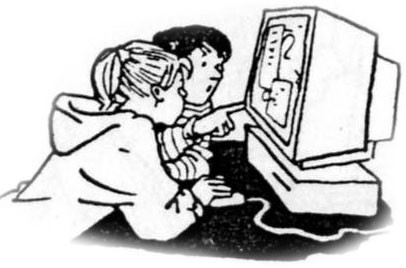
7. LARGE AMOUNTS OF INFORMATION CAN BE STORED ON COMPUTERS IN A DATEBASE.
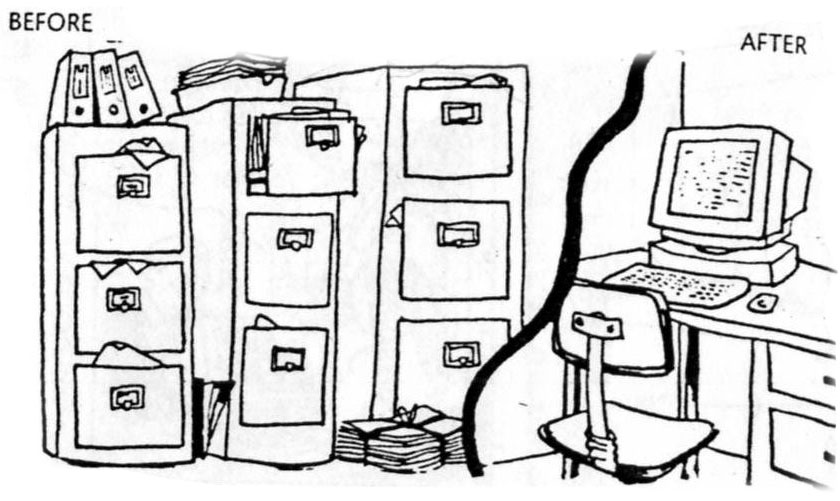
ПРАКТИЧЕСКОЕ ЗАДАНИЕ 2.
Переведите данные высказывания и назовите отрицательные стороны использования компьютера
1. MANY PEOPLE DO NOT LIKE USING COMPUTERS, AND WOULD PREFER TO DEAL WITH A PERSON INSTEAD.
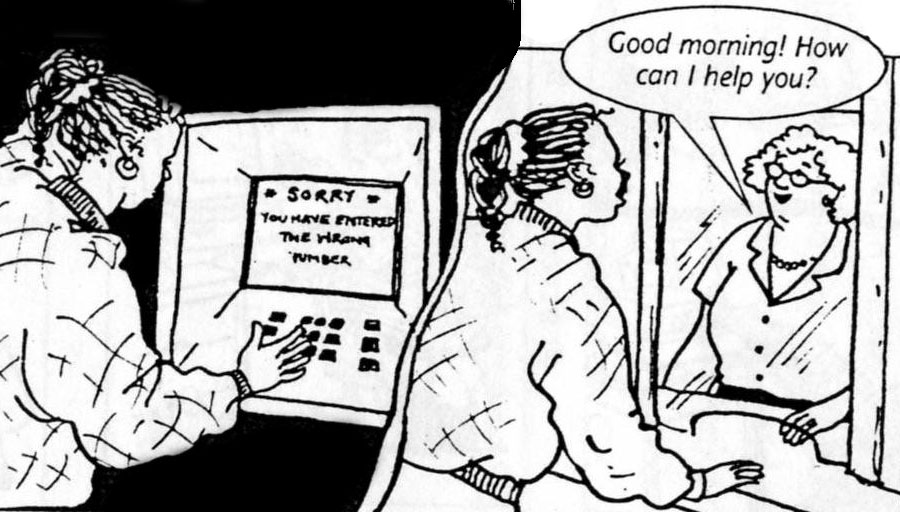
2. Computers can get viruses.
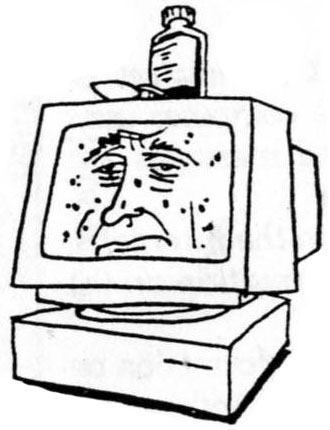
3. Some children spend too much time playing computer games,
which can be very violent.

4. Software often has bugs, and sometimes computers crash.

55. ANYONE CAN PUT INFORMATION OR IMAGES ON THE INTERNET, SO IT CAN
EASILY BE USED BY CRIMINALS TO COMMUNICATE WITH EACH OTHER, OR TO
SEND PORNOGRAPHY (PICTURES, FILM). THERE ARE NO LAWS TO STOP THIS
YET, AND IT IS EXTREMELY DIFFICULT TO POLICE THE INTERNET.

6. IF A COMPUTER IS NOT WORKING PROPERLY, MOST PEOPLE DO NOT KNOW HOW TO FIX IT , AND THIS CAN BE VERY ANNOYING.

7. COMPUTERS QUICKLY BECOME OBSOLETE, SO THEY SOON NEED TO BE REPLACED.
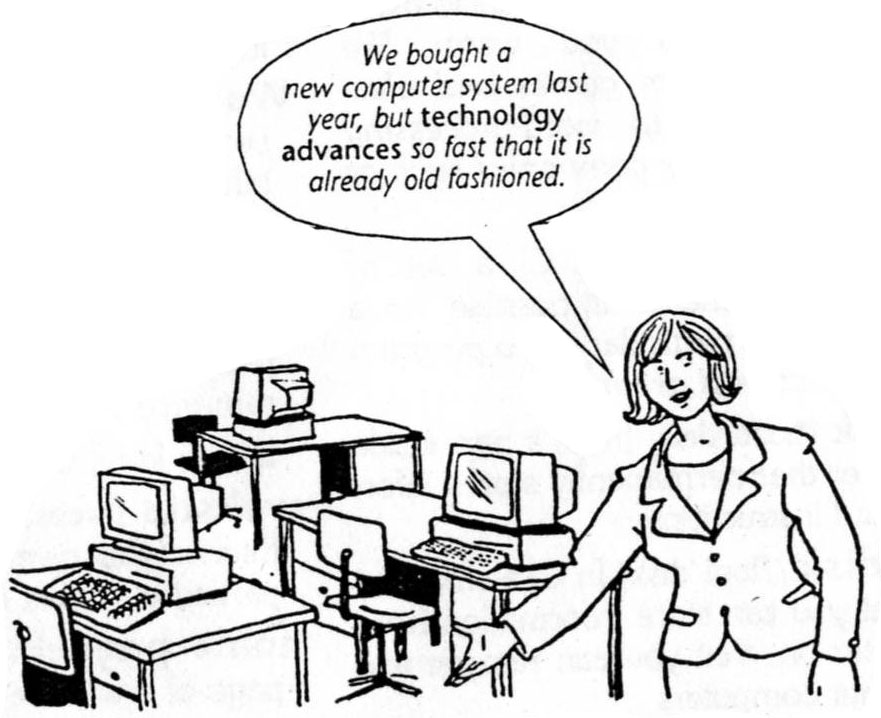
ПРАКТИЧЕСКОЕ ЗАДАНИЕ 3
Прочитайте текст и переведите
THE IMPACT OF COMPUTERS ON PEOPLE
P A R T I
The computer is one of the most powerful forces in society today. It's being used
everywhere - in homes and in organisations of all sizes - and no one can doubt that this
usage is having a strong impact on many people.
Many people enjoy careers in computer departments as managers, systems designers,
programmers, and operators. But we all benefit from computer usage. We benefit on the
job even though we aren't computer specialists. We benefit as consumers of the goods
and services provided by computer-using organisations. And we benefit at home by using
personal computers for work and for play.
Each day, computers help millions of people do their jobs more effectively. For
example, they can help managers decide on a future action (the planning function) , and
they can then help control the performance to see if planned goals are being achieved ( the
control function). And managers may not need to spend as much time in controlling when
a computer can respond with a quick report if actual performance varies from what was
planned. The time saved in controlling may allow managers to give more attention to
employee problems.
But employment benefits certainly aren't restricted to managers. Health care
researchers and other scientists now use computers to conduct research into complex
problem areas that couldn't otherwise be studied. Lawyers use legal data banks to locate
precedent cases in order to serve clients better. Sales people can receive more timely
information about products, can promise customers that their sales orders will be handled
promptly, and can thus improve their sales performance because of computer systems.
And the job duties of some office and factory workers have changed from routine,
repetitive operations to more varied and interesting tasks through computer usage. For
example, office workers who understand text processing, computer, and data
communications, usually have vital roles and are given crucial office functions to perform.
P A R T II
People also benefit as the consumers of the goods and services provided by
computer-using organisations. Here are some examples:
• Greater efficiency. Because businesses have avoided waste of time and have
improved efficiency through the use of computers, the prices we now pay are less than
they would otherwise have been. Computer uses can improve productivity - the amount
of goods and services that people and machines can produce from a given amount of input.
• Higher-quality products. Computers may also help improve the quality of the
products and services we receive. Computer-aided design (CAD) means the use of
computers and graphics-oriented software for the purpose of automating the design and
drafting process. An engineer at a CAD site - often called an engineering workstation -
can design a three-dimensional machined part, analyse its characteristics, and then subject
it to different stresses. If the part fails a stress test, its specifications can be changed. All
these steps occur as the engineer works with the CAD hardware and software. Computeraided
manufacturing (CAM) means the use of computers in the production process. The
CAM process picks up where CAD leaves off. During this production phase, robots
(devices programmed to physically manipulate their surroundings) and other computercontrolled
devices are used to produce higher-quality products.
• Better service. People may now receive better service from government agencies. In
contrast to the bureaucratic runaround that often accompanies a call to city hall, computer
system allows citizens to dial a single number, get the right city department, and be
guaranteed a response. The service benefits people receive from business computers
include (1) shorter waiting lines at banks, airline ticket offices, and hotel and car rental
desks, (2) faster and more accurate answers to the inquiries of people served by the
businesses, and 3) more efficient customer service. And the service benefits people receive
from companies in health care include (1) faster and more thorough testing to detect and
identify disease, (2) more accurate methods of physiological monitoring, and (3) better
control of lab test results and the dispensing of drugs.
• Entertainment and educational benefits. Some businesses are using computers
only to amuse and entertain us. Personal computer game programmes are being prepared
by hundreds of producers. Computer animation firms are writing programmes that give the
illusion of movement to inanimate objects. The results of this animation are now seen
regularly in movies and on TV. And the potential for computers in education has barely
been tapped.
• Improved safety. Computer usage contributes to improving quality as well as
personal safety in many ways. For example, microcomputers installed in motor cars now
provide a more efficient means of controlling the engine's fuel mixture, ignition timing,
and exhaust emissions. Computer-controlled antilock braking systems in aircraft and cars
help prevent dangerous skids and produce optimum stopping distance in all weather
conditions. Wheel-speed sensors detect if a wheel is stopping too quickly. A
microcomputer then automatically reduces hydraulic brake pressure at the wheel until the
danger has passed. And computers permit gas utility companies to do a better job of
managing and controlling the pipeline leaks that can seriously damage the environment.
• Better information retrieval. A New York surgeon contacted a medical library
when a sick woman lapsed into a hepatic coma. He needed immediate information on
exchange blood transfusions for the woman. Using a computer terminal and a retrieval
programme, the librarian searched more than a half-million medical documents in a few
minutes to get the information the surgeon needed to perform an emergency blood
transfusion. The patient recovered fully from the hepatitis. Most information retrieval
tasks obviously don't involve life-or-death decision, but quick computer-assisted retrieval
saves time for many people.
Ex. 1. Translate the following word combinations looking back at the text:
1) accurate and timely facts; 2) computer-using organisations; 3) to decide on future
actions; 4) they may not need to spend (much time); 6) timely information; 7) routine,
repetitive operations; 8) text processing; 9) bureaucratic runaround; 10) inanimate objects
Ex. 2. Find in the text English equivalents to:
1) достигать цели; 2) проводить исследование; 3) найти аналогичные случаи;
4) в отличие от ...; 5) звонок в мэрию; 6) очередь (в банк); 7) билетная касса;
8) более точные ответы на запросы; 9) поставить диагноз и определить заболевание;
10) назначение лекарств; 11) полностью выздороветь
Ex. 3. Fill in the blanks with the appropriate nouns given below. Translate the
sentences.
1. He managed to get a job as a _________ reporter at one of the daily newspapers.
2. There were many ______ from the meeting. 3. An ______ is a person to whom a
letter or any other message is addressed. 4. Many __ had to leave their home country
during the war. 5. The ______ was very anxious and wasn't able to give a good
answer. 6. You should treat your ______ the way you want to be treated.
employee, trainee, examinee, addressee, refugee,. absentee
Ex. 4. In English you can make the name of the person who does a job by adding
one of the following suffixes: -er, -r, -ian, -ist. Add one of the suffixes to the following words. You will have to change some of the words a little.
music______ art_______ farm______ science______
politics_____ manage_____________ electric_________
garden_________ photograph_____________ bank_________
law _____________ speak______________ design_________
electric____________ programme_____________
ПРАКТИЧЕСКОЕ ЗАДАНИЕ 4.
Составьте предложения с данными словами и фразами.
website , computer viruses , bug , emails, go online , crashes
Nowadays you can _______________ if your brother is using the telephone line to talk to his friends
Many people send and receive ________ rather then telephoning or using "snail mail" (letter post).
These days you can buy things on the Internet by going to the company's ___________.
Emails, computer viruses , bug , website , online shopping , crashes
Sometimes the computer ________ ,and then it is impossible to use it. You usually have to switch it off and start again.
Some people create ________________ , which infect any computer they arrive at. They are dangerous a can destroy everything on the hard disk.
If a computer program has a ____, it won't work properly.
ПРАКТИЧЕСКОЕ ЗАДАНИЕ 5
Прочитай высказывания и укажи, что из них правда, а что ложь

ПРИМЕРНЫЕ КРИТЕРИИ ОЦЕНИВАНИЯ САМОСТОЯТЕЛЬНОЙ РАБОТЫ
-
Правильное выполнение заданий 1,2- оценка «3»
-
Неправильное выполнение заданий 1,2- оценка «2»
-
Правильное выполнение заданий 1,2,4,5- оценка «4»
-
Правильное выполнение заданий 1,2,3,4,5 - оценка «5»
СПИСОК ЛИТЕРАТУРЫ
-
Ажищев Н.И., Суэта Ф.С. Пособие по английскому языку для строительных техникумов. М. Высшая школа, 1978.
2. Безручко Е.Н. Английский для архитекторов. Ростов-на-Дону.
Издательский центр «МарТ». 2002
-
Войтенко Э.В. «Учебное пособие по техническому переводу», БСК, 2001.
4. Кадырова И.А., Сафарова Р.З. Vehicle. ( Course of Technical
English.) Ufa. 2002.
-
Носова И.И., Пинзул Г.Е. «Пособие по английскому языку для машиностроительных вузов», М., 1970.
-
Парахина А.В., Пособие по переводу технических текстов с английского языка на русский. М. Высшая школа, 1982.
6. Поздняков А.А.,Быков В.В. Англо-русский словарь по строительству и новым строительным технологиям, «Русский язык», 2003.
7. Салихова Э.С., Федорова И.Г. «Пособие по техническому переводу для студентов строительных специальностей», БСК, 2005.
8. ШляховаВ.А., Любимова Т.Д. Английский язык. Контрольные
задания для студентов технических специальностей. М. Высшая
школа. 2000.
13


